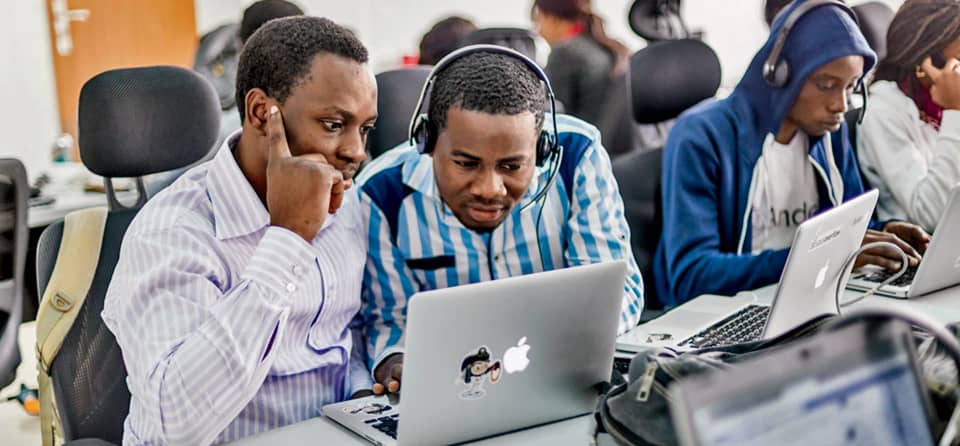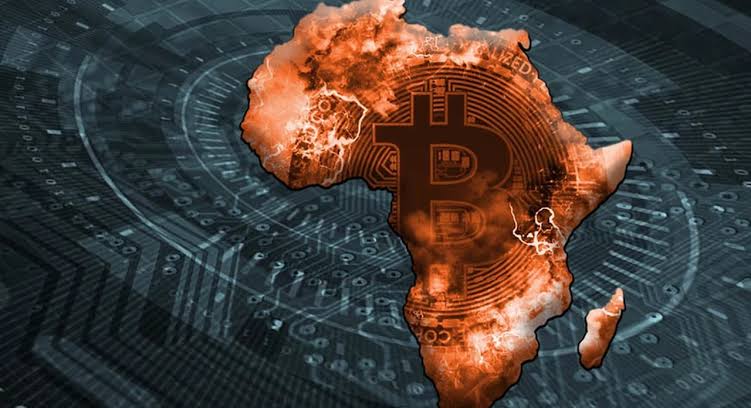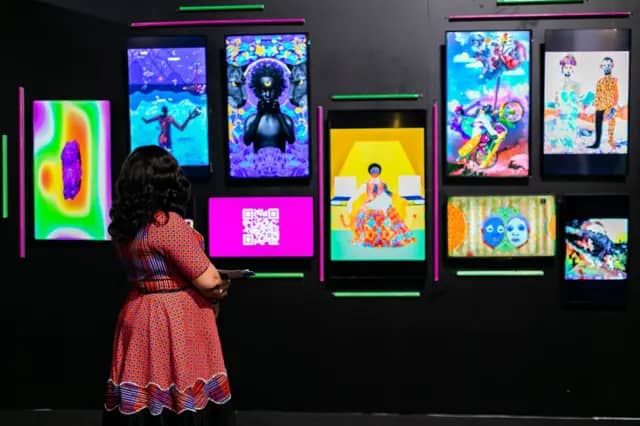When The Market Crashes But The Movement Doesn't.

The Quiet Hum of the Builders
When the global financial market tumble, the echo of the panic is resounding. Charts bleed red, headlines scream, and the hopes of observers vanish like smoke. The latest market spiral which was triggered in part by a renewed trade cold war between China and the United States was no exception. Stocks slumped, major crypto values halved, and analysts declared yet another “end of the digital dream.”
But somewhere in between the chaos of collapsing numbers and the deafening silence that follows, another persistent rhythm occurs: the quiet hum of builders, dreamers, and believers who never stop.
Across Africa, where young people are already navigating a world of constant irresolution of currency, politics, and opportunities, the crash barely caused a flinch. When the crash hit tech hubs from Lagos to Nairobi, Accra to Cape Town, the conversation wasn't about lost profits, it was about what to build next.

A conflict stands; why does the movement keep moving even when the market collapses?
Because for many young African minds, cryptocurrency and Web3 aren’t mere investments. These are ideological blueprints for a movement toward sovereignty, transparency, and liberation from the gatekeepers of the continent’s financial system.
Beyond the Ticker: The Core Philosophy
The Genesis of Belief: Distrust and Sovereignty.
At its heart, the Web3 movement was never truly about price. It always has been about power and who controls it. To the African youth navigating unreliable banking systems, fluctuating currencies, and policy shifts that come without warning, the promise of trustless technology resonates deeply.
Africa's crypto adoption continues to grow, increasing from 40.1 million to 43.5 million users, which is an 8.5% rise. Despite the relentless market crahses and regulatory roadblocks, the ownership has experienced a steady climb.
Nigeria for instance,ranks second amongst the top African countries with the highest crypto ownership, at the heels of South Africa. One report shows that 10.3% of its surveyed population owns or has purchased crypto.
In a world where access often depends on permission, blockchain has offered something tangible; self sovereignty– to hold one's own keys is to hold one's future.
The Anti-Establishment Impulse.
For decades, Africa lived under systems designed and operated elsewhere– Great Britain, The USA, The Greek– Web3 has reversed that. Our ownership is ours to define.
The movement’s early rebels saw blockchain as a challenge to centralized power. For African youth, this rebellion feels familiar– they recognize this in their fight for freedom from corrupt local systems, restrictive policies, and even global economic gatekeeping– this movement echoes the right to decide our own destiny.
The Builders’ Resilience: Development Continues.
Separating Price from Progress.
A crash only tests conviction. To the onlookers, it’s a disaster; to the builder, it’s clarity.
When prices plunged following the latest China–US tensions, causing Bitcoin to momentarily drop by over $10,000 in April 2024, developer communities in places like Nigeria didn’t disappear. Rather, they doubled down. Hackathons continued.
Telegram groups buzzed even more than they did before with more technical discussions. Courses were sold, and mentorships were provided for better navigation of the system. Discord servers stayed alive. No one gave up. The mantra became; no leave, no transfer. The drop did a simple but significant thing; it flushed out the spectators, leaving behind the resilient architects.
Scalability and Utility
During downturns, attention shifts from hype to substance. At this juncture, it is not about how much people are talking about crypto, but how tangible holding on to it is. African builders are quietly solving worldwide problems by curating Layer 2 networks that lower fees, integrating stablecoins into local trade systems, and experimenting with decentralized ID systems that could outlast governments.
From Kenya’s fintech corridors to Ghana’s Web3 art collectives, innovation has thrived even when liquidity dares to dry up, because the mission was never just profit but purpose.
Philosophy in Practice.
Uncensorable Money
In places like Zimbabwe, where inflation has historically spiralled, or Nigeria, where the local currency has faced sharp devaluations, weekly beat by the dollar or pound, digital currencies can be likened to gold; they are survival tools.
Stablecoins like USDT circulate through peer-to-peer (P2P) markets and WhatsApp groups as informal economies rise beyond the reach of broken banking systems.

Between July 2023 and June 2024, Nigeria’s crypto economy processed approximately $59 billion in crypto transaction value, making it the world's second-biggest country for retail crypto adoption (behind only India). The vast majority of these transactions are small retail trades, signalling that here, crypto isn't a bet but a breathing space.
The Creative Commons (NFTs and Creators).
African artists, musicians, and photographers are now minting independence. Through NFTs, intermediaries– who once took lion's shares of profits– are bypassed, royalties are retained, and they can connect directly with collectors. Even as global NFT prices dipped, the ideology of ownership and visibility persisted especially for young creators who have long been excluded from global markets by intercontinental logistical hurdles and information gatekeeping. A photographer in Nairobi can now receive royalties for his work every time a digital print is resold.

The Long Game.
Every generation has its revolution. The internet’s first wave connected us; Web3 aims to liberate us. And even though it seems as though liberation comes at a cost,
African builders understand that this is a marathon. The technology is still young but so are they. And like the early internet pioneers, they’re playing the long game: one codebase, one smart contract, one DAO at a time.
Coda: The Faith of the Decentralized.

Crashes expose who’s in it for profit and who’s in it for purpose.
When prices fall, speculators leave and the believers stay. Believers build. Believers teach. Believers remind the world that blockchain was never meant to make a few people rich; it was meant to make everyone free.
For Africa’s youth, that dream is the bedrock of their survival, not mere speculation.
Because even when the market crashes, the movement doesn't. It simply decentralizes the faith.
Recommended Articles
Microsoft Takes Crypto Leap: Edge Browser Set to Integrate Native Digital Wallet

Microsoft Edge is introducing a built-in crypto wallet for secure non-custodial asset management, NFT tracking, and Web3...
DeLorean Labs Accelerates Into Web3: Tokenized Cars Reshape Auto Industry

DeLorean is embracing Web3 with DeLorean Labs, leveraging blockchain to connect vehicles, owners, and fans through token...
Crypto Giant Binance Pours $500M into Musk's Twitter Bid to Supercharge Blockchain Adoption!

Binance has committed $500 million to Elon Musk's Twitter takeover, becoming a significant equity investor alongside oth...
Luno & AltSchool Ignite Crypto Education for 15,000 Nigerian Students!

Luno and AltSchool Africa have partnered to launch a free crypto education program, "Demystifying Crypto for Africans," ...
Crypto Boom: Africa Leads Global Blockchain Adoption with Staggering 1200% Market Growth

Emurgo Africa's report highlights Africa's unprecedented Web3 and blockchain adoption, showcasing a 1,668% funding incre...
You may also like...
When Sacred Calendars Align: What a Rare Religious Overlap Can Teach Us

As Lent, Ramadan, and the Lunar calendar converge in February 2026, this short piece explores religious tolerance, commu...
Arsenal Under Fire: Arteta Defiantly Rejects 'Bottlers' Label Amid Title Race Nerves!

Mikel Arteta vehemently denies accusations of Arsenal being "bottlers" following a stumble against Wolves, which handed ...
Sensational Transfer Buzz: Casemiro Linked with Messi or Ronaldo Reunion Post-Man Utd Exit!

The latest transfer window sees major shifts as Manchester United's Casemiro draws interest from Inter Miami and Al Nass...
WBD Deal Heats Up: Netflix Co-CEO Fights for Takeover Amid DOJ Approval Claims!

Netflix co-CEO Ted Sarandos is vigorously advocating for the company's $83 billion acquisition of Warner Bros. Discovery...
KPop Demon Hunters' Stars and Songwriters Celebrate Lunar New Year Success!

Brooks Brothers and Gold House celebrated Lunar New Year with a celebrity-filled dinner in Beverly Hills, featuring rema...
Life-Saving Breakthrough: New US-Backed HIV Injection to Reach Thousands in Zimbabwe

The United States is backing a new twice-yearly HIV prevention injection, lenacapavir (LEN), for 271,000 people in Zimba...
OpenAI's Moral Crossroads: Nearly Tipped Off Police About School Shooter Threat Months Ago
ChatGPT-maker OpenAI disclosed it had identified Jesse Van Rootselaar's account for violent activities last year, prior ...
MTN Nigeria's Market Soars: Stock Hits Record High Post $6.2B Deal

MTN Nigeria's shares surged to a record high following MTN Group's $6.2 billion acquisition of IHS Towers. This strategi...
